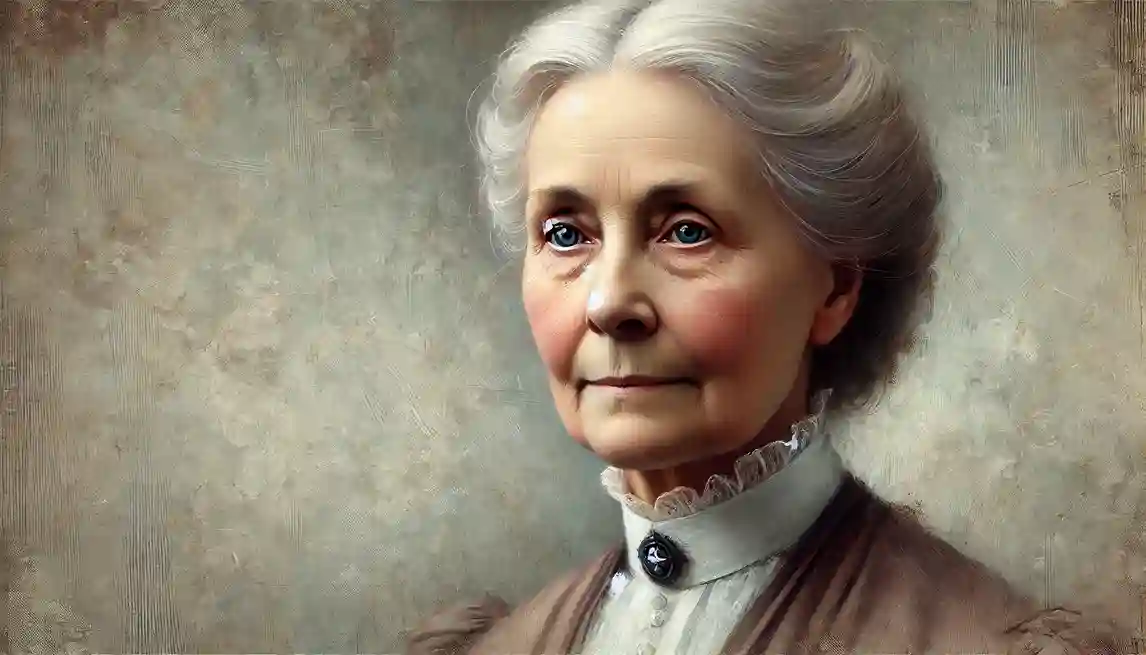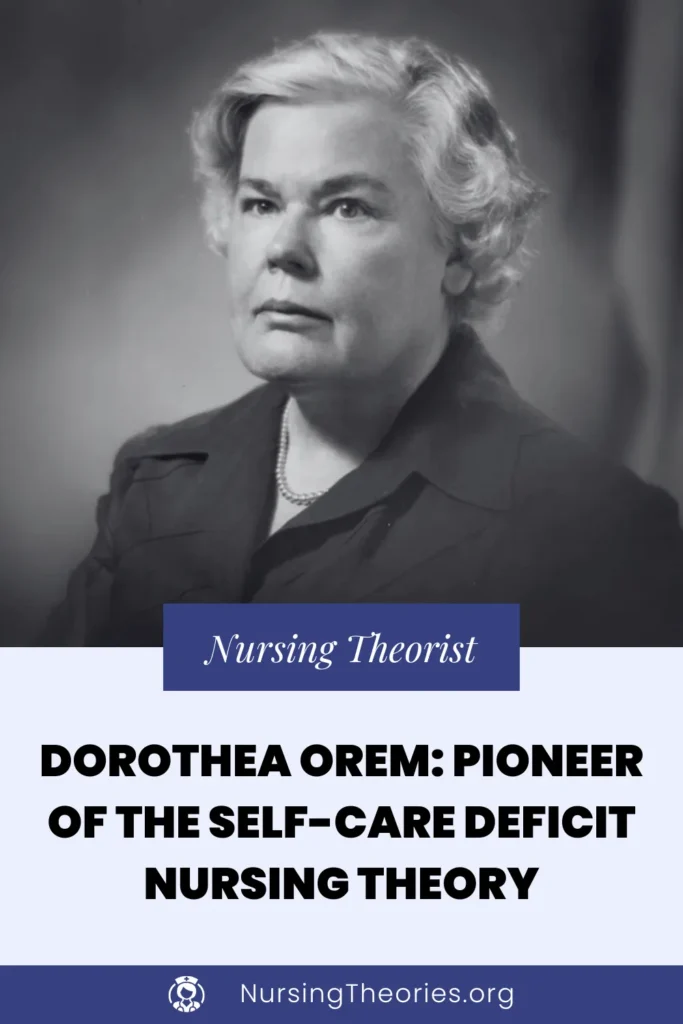Dorothea Orem, a renowned American nursing theorist, made monumental contributions to the profession by developing the Self-Care Deficit Nursing Theory (SCDNT).
Her theory provided a comprehensive framework that redefined the role of nurses, focusing on helping patients regain independence and perform essential self-care activities.
Orem’s work remains foundational in nursing education, research, and clinical practice, making her one of the most influential figures in modern nursing.
In this article, we cover Orem’s life, achievements, philosophy, and lasting impact on modern nursing.

Quick Summary
- Developed the Self-Care Deficit Nursing Theory, emphasizing the importance of self-care in patient recovery.
- Authored foundational nursing texts that became essential learning resources worldwide.
- Played a significant role in bridging nursing theory and practice by providing actionable guidelines for nurses.
- Advanced patient-centered care by focusing on assessing and addressing self-care deficits.
- Received numerous awards and honors for her contributions to nursing education and research.
Early Life and Background of Dorothea Orem

Birth and Family Background of Dorothea Orem
- Dorothea Orem was born on July 15, 1914, in Baltimore, Maryland, Orem grew up in a supportive family environment that valued education and service.
- Her parents instilled in her a strong sense of discipline and curiosity, which influenced her academic journey.
Education and Early Influences in Orem’s Life
- Orem’s early education reflected her intellectual curiosity, as she excelled in science and the humanities.
- She was inspired by the growing demand for skilled nurses and enrolled in nursing education, where she began to develop her passion for improving patient care.
Dorothea Orem’s Philosophy and Vision for Nursing
- Orem’s vision was rooted in the belief that nursing’s primary role is to assist individuals when they are unable to meet their own self-care needs.
- She emphasized that nursing should not be focused solely on illness but also on promoting patient autonomy and long-term well-being.
- Famous quote: “Nursing is perhaps best described as the giving of direct assistance to a person, as required, because of the person’s specific inabilities in self-care.”
Dorothea Orem’s Education and Early Nursing Career
Formal Education and Nursing Training of Dorothea Orem
- Orem received her nursing diploma from Providence Hospital School of Nursing in Washington, D.C., in 1934.
- She went on to earn her bachelor’s degree in nursing education from Catholic University of America in 1939 and her master’s degree in 1945.
Early Professional Experiences in Orem’s Career
- Orem’s early nursing experience included hospital nursing, teaching, and administrative roles, where she developed a deep understanding of patient care and nursing education.
- Her work in these settings provided insights into the gaps between nursing theory and practice, motivating her to create a comprehensive nursing model.
Key Achievements and Contributions of Dorothea Orem
Development of the Self-Care Deficit Nursing Theory (SCDNT)
- The Self-Care Deficit Nursing Theory identifies situations in which patients are unable to meet their self-care needs due to illness or injury, requiring nursing intervention.
- The theory includes three interrelated components:
- The Theory of Self-Care: Describes how individuals can care for themselves to maintain health.
- The Theory of Self-Care Deficit: Explains when nursing intervention is needed.
- The Theory of Nursing Systems: Describes how nurses provide care, ranging from full assistance to supportive-educative interventions.
- The theory’s practical framework has guided nursing assessments and interventions across healthcare settings worldwide.
Contributions to Nursing Education and Curriculum Development
- Orem developed educational materials and frameworks for teaching her theory to nursing students, ensuring that they could apply it effectively in clinical practice.
- Her textbooks, including Nursing: Concepts of Practice, became foundational resources in nursing education programs globally.
Research and Theoretical Advancements
- Orem’s research contributed to the advancement of nursing as a discipline by bridging the gap between theory and practical care.
- She collaborated with other nursing theorists to further refine and expand the applications of the Self-Care Deficit Nursing Theory.
Global Impact and Recognition
- Her work influenced nursing curricula and clinical standards worldwide, with her theory being implemented in hospitals, nursing homes, and community health programs.
- Orem received several awards, including honorary doctorates, recognizing her profound impact on the nursing profession.
Overview of Dorothea Orem’s Self-Care Deficit Nursing Theory
- Orem’s theory emphasizes the importance of identifying when patients are unable to care for themselves and providing the appropriate level of nursing intervention.
- It focuses on promoting patient autonomy by supporting them until they can resume self-care activities independently.
- To explore this theory in greater depth, visit the in-depth article on Dorothea Orem’s Self-Care Deficit Nursing Theory.
Notable Publications by Dorothea Orem
- Nursing: Concepts of Practice – A foundational text that outlines her Self-Care Deficit Nursing Theory and its applications.
- Guides for Developing Curricula for the Education of Practical Nurses – An influential work that shaped nursing education programs.
- Numerous research articles and contributions to nursing journals focused on integrating theory into practice.
Challenges and Criticisms of Dorothea Orem’s Work
Challenges in Defining Self-Care in Diverse Populations
- Orem faced challenges in addressing how self-care needs vary across different patient populations, particularly those with chronic illnesses or disabilities.
- She worked to refine her theory by incorporating flexibility to account for varying patient needs and healthcare settings.
Criticisms of the Self-Care Deficit Nursing Theory
- Some critics argued that the theory placed too much emphasis on individual autonomy, potentially overlooking the role of family and community support in patient recovery.
- Others suggested that the model’s structured approach could be less effective in dynamic or complex care environments, such as emergency departments.
Timeline of Major Milestones in Dorothea Orem’s Life
- 1914: Born in Baltimore, Maryland.
- 1934: Graduated from Providence Hospital School of Nursing.
- 1939: Earned her bachelor’s degree in nursing education.
- 1945: Completed her master’s degree in nursing education.
- 1971: Published Nursing: Concepts of Practice.
- 1998: Retired after a long and impactful career in nursing research and education.
- 2007: Passed away in Savannah, Georgia, leaving behind a lasting legacy.
Legacy and Lasting Impact of Dorothea Orem
Impact on Nursing Practice and Patient Care
- Orem’s theory transformed nursing practice by providing a structured framework for assessing patients’ self-care needs and designing interventions accordingly.
Global Influence and Recognitions
- Her theory has been integrated into nursing curricula worldwide and continues to influence nursing research and practice.
- Orem received numerous awards for her contributions, including honorary degrees and recognition from major nursing organizations.
Final Years and Death of Dorothea Orem
- After retiring, Orem continued to mentor nursing scholars and contribute to the development of nursing theories.
- She passed away in 2007, but her work continues to inspire nurses globally.
Key Lessons from Dorothea Orem for Modern Nursing
- Promoting patient autonomy: Helping patients regain independence is a key part of holistic care.
- Structured nursing assessments: The Self-Care Deficit Nursing Theory provides clear guidelines for assessing and addressing patient needs.
- Flexibility in care: Tailoring nursing interventions to meet individual patient needs is essential for effective care.
- Integrating theory into practice: Bridging theoretical models with real-world nursing improves patient outcomes.
- Continuous learning: Orem’s dedication to research and education demonstrates the importance of lifelong learning in nursing.
Conclusion
Dorothea Orem’s Self-Care Deficit Nursing Theory redefined how nurses approach patient care by emphasizing the importance of independence and self-care.
Her legacy lives on through her textbooks, research contributions, and the countless nurses who apply her principles daily.
Orem’s work, explored further in the in-depth article on the Self-Care Deficit Nursing Theory, serves as a foundation for patient-centered, evidence-based nursing, ensuring her impact will be felt for generations to come.


